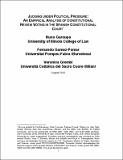| dc.contributor.author |
Nuno Garoupa, Fernando Gomez-Pomar, Veronica Grembi |
| dc.coverage.spatial |
Spain |
| dc.date.accessioned |
2016-01-07T15:26:49Z |
| dc.date.available |
2016-01-07T15:26:49Z |
| dc.identifier.uri |
http://desa1.cejamericas.org:8080/handle/2015/2250 |
| dc.description.abstract |
In this paper we study the extent to which decisions by the Spanish Constitutional Court are explained by political variables. Our theory proposes that party alignment should play an important role in explaining the behavior of the Spanish constitutional judges, but with some limitations given the institutional constraints faced by the court. Therefore, we do not propose pure party alignment but a more sophisticated strategy model based on the interaction between the advancement of ideological goals with the limitations imposed essentially by the civil law tradition of consensual courts. Using a unique dataset of abstract review cases in 1980-2006, we conclude that the patterns of political influence in the Spanish Constitutional Court are complex and cannot be easily framed merely as the pure reflection of the attitudinal model, and of left/right alignment. |
| dc.language.iso |
English |
| dc.title |
Judging Under Political Pressure: An Empirical Analysis of Constitutional Review Voting in the Spani |
| dc.ceja.source |
Fuente: Universidade de Porto |

